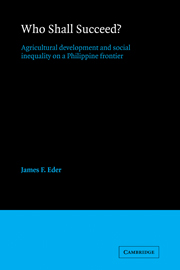Book contents
- Frontmatter
- Contents
- List of tables, figures, and maps
- Preface
- 1 Introduction
- 2 Rich man, poor man: life in a frontier farming community
- 3 The economic and social origins of the migrant farmers
- 4 Eight migrants
- 5 The origins of social inequality
- 6 The maintenance of social inequality: earning a living
- 7 The maintenance of social inequality: earning prestige
- 8 The perpetuation of social inequality?
- 9 Conclusion
- Appendixes
- Notes
- Bibliography
- Index
6 - The maintenance of social inequality: earning a living
Published online by Cambridge University Press: 23 May 2010
- Frontmatter
- Contents
- List of tables, figures, and maps
- Preface
- 1 Introduction
- 2 Rich man, poor man: life in a frontier farming community
- 3 The economic and social origins of the migrant farmers
- 4 Eight migrants
- 5 The origins of social inequality
- 6 The maintenance of social inequality: earning a living
- 7 The maintenance of social inequality: earning prestige
- 8 The perpetuation of social inequality?
- 9 Conclusion
- Appendixes
- Notes
- Bibliography
- Index
Summary
This chapter and the next examine the sources of short-term stability in San Jose's status order. A starting point is the observation, widely made in San Jose, that farmers, once rich or poor, tend to remain that way – although the tendency is only that, and the exceptions are noted and commented upon. But the workings of village economy and society today, at least over the short term, do seem to promote the well-being of the rich and inhibit that of the poor. In the words of Polly Hill, who studied socioeconomic differences in a rural Hausa village:
The lot of a poverty-stricken farmer … may be likened to that of solitary cyclist invariably peddling up hill and against the wind, while others speed by in the opposite direction: to travel a given distance he has to expend much more effort than a richer man, and the wind will always be contrary.
[1972:141]In Chapters 6 and 7, I will explain how rich men travel with the wind while the poor must travel against it. My explanation elaborates upon the notion that not all farmers occupy the same decision making environments. Of course, each farmer's decision-making environment is ultimately unique, but there are important regularities within and between status levels that are my concern here. In brief, my argument is: confronted by unique patterns of opportunities and limitations, and acting on their own status-related perceptions of the costs and benefits of various courses of action, farmers of differing social status positions diverge systematically in how they earn their livings and in how they utilize their leisure time.
- Type
- Chapter
- Information
- Who Shall Succeed?Agricultural Development and Social Inequality on a Philippine Frontier, pp. 99 - 128Publisher: Cambridge University PressPrint publication year: 1982



